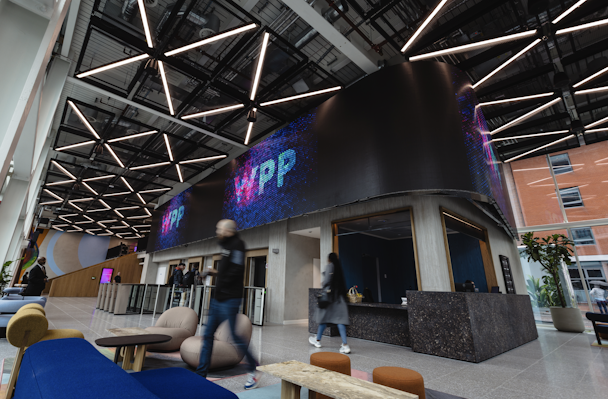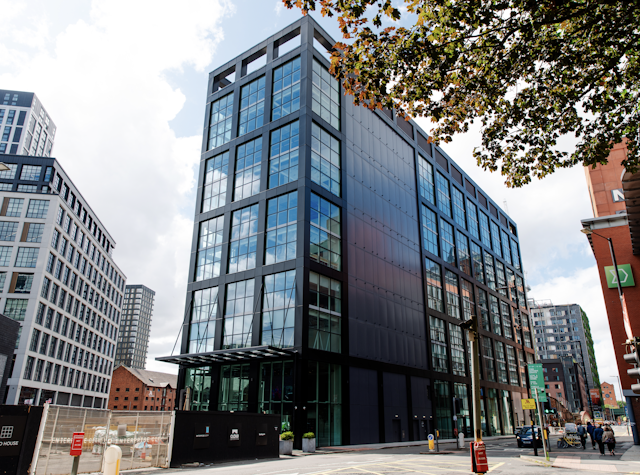Why WPP and Dentsu are making a big bet on Manchester despite remote revolution
Both WPP and Dentsu have moved into plush new premises in the center of Manchester. But in this hybrid age, and with WPP and co increasingly talking up the prospects of AI, why invest in urban space now?

Inside the new WPP campus in central Manchester / WPP
Yayoi Kusama’s polka dot patterns and inflatable sculptures have earned her a reputation as the most Instagram-able artist in the world. Perhaps that quality makes her latest work You, Me And The Balloons a fitting show to open Manchester’s newly constructed arts venue, Aviva Studios. Who else but an artist whose work inspires influencer posts and aspirational social content should greet the world’s biggest ad agencies to the neighborhood?
Less than half a mile away from the exhibition, ad agencies and production companies are rushing to populate an emerging city quarter of new industry and commerce. Kusama is not the only Japanese import to grace Manchester in recent weeks. Agency holding company Dentsu just invested in a ‘hub’ of offices and studios not far from the exhibition venue. The new premises, which include a cinema and gym, host Carat, iProspect, CX unit Dentsu X, data company Merkle and Dentsu Creative.
Advertisement
Just a week later, its rival WPP has established its latest ‘campus’ building – its 36th worldwide, and the second British campus outside London – also within five minutes’ walk of Kusama’s bold installations. It boasts a cafe, dedicated spaces for working mothers and a rooftop terrace.
550 staff, from agencies such as Code Computerlove, Wavemaker, EssenceMediacom, Kinetic and creative shop Cheetham Bell have been concentrated across eight floors here, alongside new outposts for VMLY&R Health and Ogilvy Health, attracted by the region’s considerable pharmaceutical industry. The move puts the north’s de facto capital on par with WPP’s other big regional bases in Guangzhou, Milan, Prague and Toronto.
Karen Blackett, WPP’s UK president, says that while Manchester has already been home to some of its agencies for more than 30 years, it has now become “the second largest city, after London, for creativity in Europe.”
“It’s a combination of a creative hub and a big talent base,” she says. “When we look at the areas which are important for the future of what we do – data, digital, AI – it’s an area where talent is coming out of the universities with a skillset we need and a skillset out clients need.”

Quarter measures
Blackett says the company expects the area to become a “creative hub” within the city. Though Manchester's uniquely trendy Northern Quarter has long hosted indie agencies next to record shops and clothing boutiques, EssenceMediacom North chief operating officer Paul Cooper argues the city has lacked a “quarter” for professional creatives.
“It’s something Manchester doesn’t have. There isn’t really a particular creative or art quarter of Manchester. When we were talked to [developers] Allied, that was the vision – to create a vibe and culture that people want to be part of,” he says.
Advertisement
Part of that culture has already been set, via the area’s long-standing connection to the TV industry, with production companies Endemol and Studio Lambert based on the same street as WPP’s new campus. The building itself is built “over the cobbles,” as Blackett is keen to point out, of the original Granada Studios where soap opera Coronation Street was once filmed.
The new campus was opened with a speech from Manchester's mayor, Andy Burnham, whose agenda tallies neatly with WPP’s hopes for the area. He’s embarked on an overhaul of the city’s public transport system, replacing its privatized and expensive buses with an integrated system in the style of Transport for London. The aim is to make traveling about the city’s core better and cheaper for residents.
Suggested newsletters for you
Most of WPP’s local workforce live within the city center, one executive tells The Drum, a fact that demonstrates the area’s long turnaround. Just 500 lived within the bounds of the center in 1990; by 2025, the council expects that to rise to 100,000.
“You didn’t come south of Deansgate [the city's central thoroughfare] in the 90s. It was a wasteland,” says Cooper. Now, between Enterprise City and the nearby Spinningfields development, WPP’s new neighborhood has The Ivy, Marks & Spencer and soon, an outpost of Soho House within reach – everything required to keep visiting London client execs content.
Cooper also points out that the closeness of Dentsu and WPP’s offices will allow it to more easily poach rival talent. “It’s a shorter journey for when they come to work for us,” he jokes.
Investing now
WPP's campus-building program has proceeded more or less unhindered by the move towards remote working. The financial efficiencies to be gained by consolidating the company’s vast real estate footprint (here that means going from six offices to one) are considerable and by 2025, it expects 80% of its staff to be based out of one of these centers.
The Manchester premises do hold some concessions towards a more flexible work style – Blackett points to “collaborative hubs, workspaces” designed by WPP’s house architecture studio BDG as means of enabling that, while Cooper points to breakout areas as having potential to mix up teams and promote new intra-corporate socializing.
But the best, and potentially longest-term justification for an investment like this comes from Mark Read, WPP’s chief executive. As AI tools change the services WPP’s agencies offer, the way it supplies them and how it charges for them, he argues its talent will play an even bigger role in differentiating it from the competition.
“We have the best people, and our people understand how to apply this technology and use it well,” he tells The Drum. And to recruit new blood into the organization – and to keep the individuals it already has – he says it needs its attractive, comfortable workplaces.
One question remains. Statistically, Manchester sees rain almost every other day. What’s the ROI on that roof terrace going to be like?

